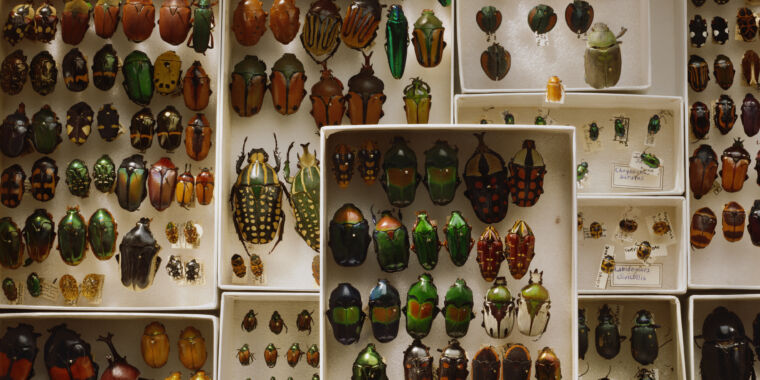Unraveling The Mystery of Beetle Diversity
Caroline Chaboo’s fascination with tortoise beetles is palpable. These remarkable insects come in a dazzling array of hues, resembling precious gems in nature’s tapestry. From shiny blues and vibrant reds to intricate orange patterns and translucent bodies speckled with gold, the diversity of tortoise beetles is a sight to behold. Belonging to the Chrysomelidae family, which encompasses 40,000 species of leaf beetles, these creatures represent a significant component of the beetle order Coleoptera.
As an esteemed entomologist at the University of Nebraska, Lincoln, Chaboo has long pondered the peculiar dominance of beetles in the animal kingdom. Despite their robust exoskeletons and distinctive appearance, beetles constitute a staggering one-fourth of all animal species. This anomaly has intrigued biologists for generations, dating back to the days of Charles Darwin, who himself was an avid collector of beetles.
The Enigma of Beetle Abundance
Out of approximately 1 million known insect species on Earth, beetles represent a substantial portion, with around 400,000 identified species. Moreover, new beetle species continue to be described each year, underscoring the enduring mystery of their abundance. While the precise reasons for the proliferation of beetle species remain elusive, researchers are beginning to unravel the enigma.
One prevailing hypothesis suggests that beetles owe their abundance to their ancient origins. With a lineage stretching back 350 million years, beetles have had ample time to diversify and evolve into distinct genetic lineages. In contrast, modern humans have existed for a mere fraction of that time, highlighting the evolutionary advantage that beetles have accrued over millennia.
However, the age of a species does not guarantee an increase in its diversity. Some ancient creatures, such as the coelacanth fish and the tuatara reptile, have experienced dwindling species numbers over time, despite their longevity. Hence, additional factors must contribute to the remarkable species richness observed in beetles.
The Resilience of Beetles Through Extinction Events
Another intriguing explanation for the profusion of beetle species lies in their remarkable resilience to extinction events. Surviving at least two mass extinctions throughout their evolutionary history, beetles have showcased a remarkable ability to endure and adapt to changing environmental conditions. Recent studies utilizing fossil records have revealed that beetles’ capacity to avoid extinctions may be as crucial as their diversification in explaining their species abundance.
Moreover, beetles have demonstrated a remarkable ability to shift their ranges in response to climate variations, enabling them to survive and thrive despite environmental challenges. This adaptability and resilience have undoubtedly contributed to their longstanding success as one of the most diverse and resilient groups of organisms on Earth.
Image/Photo credit: source url





